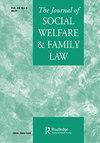Detrimental reliance and the family home: orthodoxy restored?
IF 0.9
Q2 LAW
引用次数: 0
Abstract
In Hudson v Hathway [2022] EWHC 631 (QB) (noted Sloan 2022), Kerr J excited much controversy by suggesting that detrimental reliance may not need to be shown by a joint legal owner seeking to establish an increased share of the family home under a common intention constructive trust. In a swiftly following judgment ([2022] EWCA Civ 1648), however, the Court of Appeal reaffirmed the requirement of detrimental reliance in both ‘sole’ and ‘joint names’ cases, albeit also concluding that the case did not turn on the point after all. Lee Hudson and Jayne Hathway, a separating unmarried couple, agreed in a lengthy email correspondence that Mr Hudson would retain full ownership of some shares and a pension, while Ms Hathway would have the equity in Picnic House, their former joint home, its contents, savings and income from endowments. The house was in joint names, without an express declaration of trust. Mr Hudson sought an order for sale of Picnic House under the Trusts of Land and Appointment of Trustees Act 1996, with equal division of the proceeds. Ms Hathway agreed to sale but argued that she was entitled to all of the sale proceeds on the basis of a common intention on which she had detrimentally relied (see Sloan 2022 for more detail). At first instance, Judge Ralton found a clear agreement, forming the basis of a constructive trust, that Ms Hathway was beneficially entitled to all of the equity in Picnic House. He accepted that she had detrimentally relied on the agreement by giving up her claims to assets in Mr Hudson’s sole name. Mr Hudson appealed on the basis that the judge was wrong to find detrimental reliance. Ms Hathway countered that it was unnecessary to find such reliance in a joint names case, and that in any event the judge was correct to find detrimental reliance. Kerr J seemingly agreed with Ms Hudson that proof of detriment was not required in ‘joint names’ cases, but found it established on the facts. Mr Hudson appealed again. Originally, the submissions related to detrimental reliance. But at the Court of Appeal’s prompting, and with its permission, Ms Hathway’s counsel successfully advanced the new, alternative, argument that two of Mr Hudson’s emails complied with the statutory formalities for the disposition of an interest in land, so that the detrimental reliance issue did not arise. As Lewison LJ (giving the lead judgment with which Andrews and Nugee LJJ agreed) recognised, the question of whether the emails complied with statutory formalities was有害的依赖和家庭:正统的恢复?
在Hudson v Hathway [2022] EWHC 631 (QB)(注意到Sloan 2022)一案中,Kerr J提出,在共同意图建设性信托下寻求增加家庭房屋份额的共同法定所有人可能不需要证明有害依赖,这引发了很多争议。然而,在随后的判决([2022]EWCA Civ 1648)中,上诉法院重申了在“单独”和“联名”案件中有害依赖的要求,尽管也得出结论认为案件根本没有转向这一点。李•哈德逊(Lee Hudson)和詹•哈德韦(Jayne hathaway)在一封冗长的电子邮件通信中同意,哈德逊将保留部分股份的全部所有权和养老金,而哈德韦将拥有他们以前共同居住的野餐屋(Picnic House)的股权、里面的物品、储蓄和捐赠收入。这所房子是共有的,没有明确的信托声明。哈德森先生根据《1996年土地信托和委任受托人法案》申请出售野餐屋的命令,并平等分配收益。海瑟薇同意出售,但辩称,基于一个共同的意图,她有权获得所有出售所得,而她对这个共同的意图产生了不利的依赖(详见Sloan 2022)。在一审中,Ralton法官发现了一项明确的协议,构成了建设性信托的基础,即海瑟薇享有野餐屋的所有权益。他承认,她通过放弃以哈德森先生的名义对资产的要求,对该协议产生了不利的依赖。哈德森先生提出上诉的依据是,法官认定有害信赖是错误的。海瑟薇反驳说,在联名案件中,没有必要认定这种依赖,而且无论如何,法官认定有害依赖是正确的。Kerr J似乎同意哈德森女士的观点,即在“联名”案件中不需要损害证据,但发现这是建立在事实基础上的。哈德森再次上诉。最初,这些意见书涉及有害信赖。但在上诉法院的推动下,海瑟薇的律师成功地提出了新的替代论点,即哈德森的两封电子邮件符合处置土地权益的法定手续,因此没有出现有害的依赖问题。正如Lewison LJ(给出Andrews和Nugee LJJ同意的主要判决)所认识到的那样,电子邮件是否符合法定手续的问题是
本文章由计算机程序翻译,如有差异,请以英文原文为准。
求助全文
约1分钟内获得全文
求助全文
来源期刊
CiteScore
2.00
自引率
13.30%
发文量
52
期刊介绍:
The Journal of Social Welfare & Family Law is concerned with social and family law and policy in a UK, European and international context. The policy of the Editors and of the Editorial Board is to provide an interdisciplinary forum to which academics and professionals working in the social welfare and related fields may turn for guidance, comment and informed debate. Features: •Articles •Cases •European Section •Current Development •Ombudsman"s Section •Book Reviews

 求助内容:
求助内容: 应助结果提醒方式:
应助结果提醒方式:


